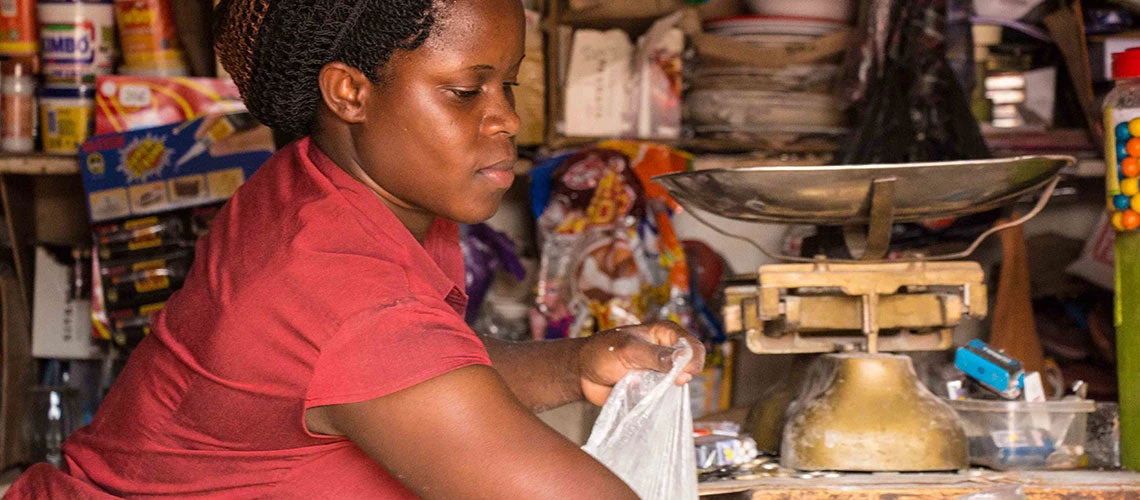 Sarah Nakagulire tends her shop in the neighborhood of Ttula, in Kampala, Uganda. Photo: Sarah Farhat/ The World Bank
Sarah Nakagulire tends her shop in the neighborhood of Ttula, in Kampala, Uganda. Photo: Sarah Farhat/ The World Bank
What will it take to help women entrepreneurs reach their full potential in Uganda, where women own one in three of all businesses yet tend to run businesses that are smaller and operate in less profitable sectors than those of men? A growing body of impact evaluation literature on what has already worked to help empower women across Sub-Saharan Africa and beyond may help us unearth some answers. We synthesize the key results and messages from this literature in a new policy brief: Unlocking the Potential of Women Entrepreneurs in Uganda, prepared by the World Bank’s Africa Gender Innovation Lab and the Social Sustainability and Inclusion Global Practice. The evidence will be used to help inform the design of interventions for the new International Development Association (IDA) operation, Generating Livelihoods and Opportunities for Women (GLOW) in Uganda, that seeks to support women entrepreneurs across the country.
Uganda has a strong culture of entrepreneurship, including among women, and is one of only seven countries worldwide that has achieved gender parity in terms of the number of women driven to pursue entrepreneurial activities. Uganda’s female labor force participation rate is also high compared to other Sub-Saharan countries, but has been falling since 2012, especially among young urban women. The COVID-19 pandemic has also had a profound negative impact on Uganda’s labor markets, affecting women more than men with larger work stoppages in urban areas and in non-agriculture sectors.
In the policy brief, we examine several programs that have already proven to be effective in addressing gender gaps in skills and capital, and sectoral sex-segregation to help boost the profits and livelihoods of women entrepreneurs. Some examples include:
- Loan products less reliant on collateral that unlock borrowing for women to improve their access to and use of capital, and secure savings products, which give women entrepreneurs greater control over their business savings.
- Comprehensive economic inclusion packages that bundle life skills and business training, cash grants and savings groups, and community sensitization (among other interventions) to simultaneously address the multiple constraints faced by small-scale businesses, particularly those owned by women.
- Psychology-based entrepreneurial trainings that focus on strengthening persistence, proactiveness, and innovation, which have worked better than traditional business trainings to increase women’s profits across multiple contexts, including in Uganda and Togo.
- Programs that increase women’s exposure to more profitable male-dominated sectors — for example, by expanding their social networks and training opportunities, as well as by providing access to larger volumes of growth capital.
The GLOW project in Uganda intends to create an enabling environment for women’s enterprises by delivering a package of services that pairs finance with business development services and productive infrastructure. It will provide investment finance; enhance technical, socio-emotional, and digital skills; establish professional and business networks; and coordinate greater access to new information and market opportunities. The proposed approach will address social norms and increase women’s access to economic and social infrastructure through the provision of common-user facilities for women to include childcare and other infrastructure that supports women’s participation in work. Notably, the specific needs of refugees and host communities will be integrated across the project’s interventions.
Impact evaluation to test the effectiveness of the new innovations in support of women entrepreneurs will also be considered. In doing so, it would not only support the Government of Uganda to deliver future operations more successfully for women-owned firms but also strengthen the global understanding of the key constraints faced by women entrepreneurs and shed light on new solutions to help overcome them.






Join the Conversation